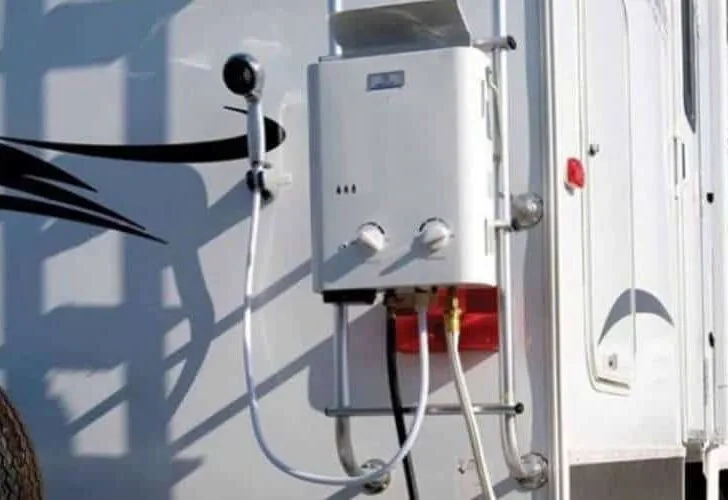RV provides all the luxuries of home so you can spend your vacation in it without any problems. One disadvantage of traveling in an RV is running out of hot water during showering.
The water heater installed inside the RV has small water tanks with low water carrying capacity.
These water tanks require continuous energy to perform their function of heating. You can solve this problem by installing tankless water heaters inside the RV.
Are RV Tankless Water Heaters Worth It? RV tankless water heater is cost-effective and saves more energy than tank-style water heaters. It requires less space with easy installation and low chances of tank explosion. You can provide your RV with an endless amount of hot water with no lag time.
Are RV Tankless Water Heaters Worth It?
The on-demand water heater performs its activity when you turn ON the hot water tap.
They instantly warm the water running through the pipes instead of heating the whole tank; thus require less energy than the conventional water heating system.
They have an adjustable control panel; you can quickly fix water temperature according to your preference.
Due to heating the water in the pipeline, not the camper’s water tank, the on-demand water heaters can provide a surplus amount of hot water in every faucet.
The energy yield of the on-demand water heater
It is more energy-efficient than other water heaters because of its low operating expense. You can save approximately 50% of your RV propane or electricity by installing them.
The energy efficiency of tank-style water heaters depends on the amount of water use inside the camper. The camper has 6-gallon or 10-gallon of warm water tanks.
The four persons inside the RV can quickly utilize hot water; then, they have to wait for some time so that heater performs its activity and they can use more hot water.
The instant water heater only starts its heating when there is a need for water utilization.
On the other hand, ordinary water heaters need continuous energy to heat the water tanks whether you need hot water or not.
Increase its life expectancy
According to the energy department, the average life expectancy of water heaters is 9 to 12 years. It can survive more and last up to 20 years or more.
Most of the time, you used your camper during vacations; at other times, you have to store them in parking lots.
It will further increase their life expectancy because of less usage.
If you are a full-time camper user, you will notice that it can last longer than your previous water heater because they only start working when there is a water demand.
The instant heating of water in different pipes reduces excessive wear and tear, further elevating their life expectancy.
Cost-efficient in the long run
Its installation cost is greater than the conventional ones, but they can easily save your expenses in the long term.
The traditional water heater requires continuous fuel for heating and reheating the water to make it hot all the time.
On the other hand, they only need energy during water demand. The conventional water heater has greater weight than the on-demand water heater.
Decrease risk of leakage inside the RV
The tank-style water heaters are more prone to damage than tankless water heaters. The gasket in them is the primary source of leakage.
The water heater also build-up mineral deposits in them due to the continuous heating of hard water. The mineral build-up can result in excessive corrosion of the tank that leads to leakage.
The water tank also becomes corroded if you use it longer than its actual working requirement.
On the other hand, the tankless heater has a lower risk of leakage due to the absence of a tank.
The possible reason for leakage is the corrosion in the pipeline or its joints. Most of them show leakage when they reach their specific age or due to an improper ventilation system inside the camper.
You need to check all the pipeline and their connection or the functionality of the ventilation system before installing them.
Constant availability of hot water
Another beneficial feature is the continuous supply of hot water.
The RV tanks can hold 6 gallons of water with an upgrade of 10 to 12 gallons. You can easily use it by doing everyday activities like showering, washing dishes and clothes.
They detect the flow of water from the pipeline then start the working of its heating by using gas or electricity. As a result, the hot water starts to run from the water outlets.
Decrease threat of tank explosion
The risk of tank explosion is more significant in water heaters than tankless heaters. It happens due to the blockage of temperature and pressure valves.
The blockage of valves occurs due to the accumulation of minerals and their sediment from water heating.
Due to this blockage, pressure builds up inside the tank that can cause severe explosions and injuries. It is essential for the safety of your vehicle to check the pressure and temperature valve monthly.
Due to the absence of tanks, minerals and sediments do not build up. You can also maintain the temperature of water in them that can prevent the risk of skin burns from the hot water.
Its inner lining also erodes due to the continuous accumulation of hard water.
This rusted water then passes through the pipes and exposes your family to toxic metals.
The water from the on-demand heating system is safer for your skin and significantly decreases the risk of skin problems.
Electric or gas RV tankless water heater
Another helpful feature of on-demand water heaters is that they are available in different fueling options.
They are environmentally friendly and can use 98% fuel to heat the water. They are easy to mount and powered by electrical systems like the solar panel or the generator.
But they are not as environmentally beneficial as electric ones; because they discharge greenhouse gases into the atmosphere.
They need a proper venting system for their activity; thus, installing them is challenging. You can use propane and kerosene in these heaters as fuel for heating.
Venting technology for gas tankless water heaters
The gas on-demand heater requires a proper venting system for its adequate performance. These are inexpensive to buy, but their installation requires a lot of expense.
There are two types of gas tankless water heaters i-e condensing and non-condensing.
The non-condensing units require stainless steel vents to discharge hot gases from the camper. They are less energy efficient than the condensing one that does not expel out hot gases.
The condensing units use these hot gases for heating the water inside the pipeline of RV by sending it through the heat exchanger.
Design of tankless water heaters for RV
Everybody wants to use equipment that is easy to operate.
You can also purchase the on-demand water heaters that come with a display screen. So you can easily adjust them and operate them according to your choices.
A small portable device is beneficial for long showers, saves a lot of your expense in buying an entire water heating system, and uses less fuel than the conventional one.
The RV water tanks have different capacity of water holding; some of them hold 6 gallons, and other can carry up to 10 gallons of water.
Make sure that you measure the length and width of your new heater, then make adjustments in that old area according to it.
These water heaters have less weight than conventional water heaters of RV that can conserve most of the fuel of your camper.
They are referred to as Green because of their low fuel usage and spreading less toxicity in the environment.
Related Articles:
How to repair a cracked RV water heater tank?
How to make RV table more sturdy?

